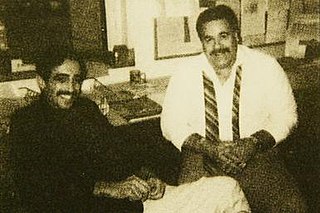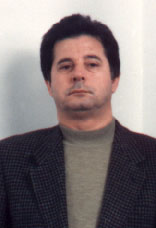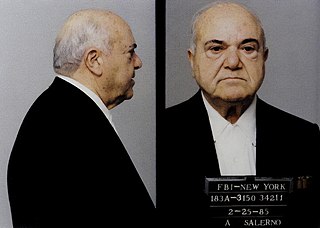
The Racketeer Influenced and Corrupt Organizations (RICO) Act is a United States federal law that provides for extended criminal penalties and a civil cause of action for acts performed as part of an ongoing criminal organization.

The Gambino crime family is an Italian-American Mafia crime family and one of the "Five Families" that dominate organized crime activities in New York City, within the nationwide criminal phenomenon known as the American Mafia. The group, which went through five bosses between 1910 and 1957, is named after Carlo Gambino, boss of the family at the time of the McClellan hearings in 1963, when the structure of organized crime first gained public attention. The group's operations extend from New York and the eastern seaboard to California. Its illicit activities include labor and construction racketeering, gambling, loansharking, extortion, money laundering, prostitution, fraud, hijacking, and fencing.

Stephen Caracappa and Louis Eppolito were former New York City Police Department (NYPD) detectives who committed various illegal activities on behalf of the Five Families of the American Mafia, principally the Lucchese and Gambino crime families. The two subsequently became known as the "Mafia Cops".

Eugene Gotti is an American mobster in the Gambino crime family. He was sentenced to 50 years in prison in 1989 for racketeering and drug trafficking charges; he was released in 2018.
The Mafia Commission Trial was a criminal trial before the United States District Court for the Southern District of New York in New York City, United States, that lasted from February 25, 1985, until November 19, 1986. Using evidence obtained by the Federal Bureau of Investigation, 11 organized crime figures, including the heads of New York City's "Five Families", were indicted by United States Attorney Rudolph Giuliani under the Racketeer Influenced and Corrupt Organizations Act (RICO) on charges including extortion, labor racketeering, and murder. Eight of them were convicted under RICO, and most were sentenced to 100 years in prison on January 13, 1987, the maximum possible sentence under that law.
Racketeering is a type of organized crime in which the persons set up a coercive, fraudulent, extortionary, or otherwise illegal coordinated scheme or operation to repeatedly or consistently collect a profit.
Scheidler v. National Organization for Women, 547 U.S. 9 (2006), was a lengthy and high-profile U.S. legal case interpreting and applying the federal Racketeer Influenced and Corrupt Organizations Act (RICO): a law originally drafted to combat the mafia and organized crime, the Hobbs Act: an anti-extortion law prohibiting interference with commerce by violence or threat of violence, and the Travel Act: a law prohibiting interstate travel in support of racketeering.
This article is about events in organized crime in 1984.
National Organization for Women v. Scheidler, 510 U.S. 249 (1994), is a United States Supreme Court case in which the Court ruled that the Racketeer Influenced and Corrupt Organizations Act (RICO) could apply to enterprises without economic motives; anti-abortion protesters could thus be prosecuted under it. An organization without an economic motive can still affect interstate or foreign commerce and thus satisfy the Act's definition of a racketeering enterprise.
Louis Vallario, also known as "Big Louie" and "Big Lou", is a member of the Gambino crime family who was a top aide to boss John Gotti and Salvatore "Sammy the Bull" Gravano in the late 1980s.
The Lucchese crime family's New Jersey faction, also known as the Jersey Crew, is a powerful crew within the Lucchese crime family. The members operate throughout the Northern New Jersey area. During the 1970s into the late 1980s, the crew was led by Anthony Accetturo and his protégé Michael Taccetta. In 1987, Victor Amuso took over the family and began demanding a higher percentage of tribute from the crew. Accetturo refused and a war erupted between the New Jersey members and the New York members. This left brothers Michael and Martin Taccetta in charge of the crew as they tried to have Accetturo and his family murdered. In 1993, Accetturo defected and became a government witness. He helped convict Michael and Martin Taccetta. The crew was most recently controlled by Ralph Perna.

Giovanni "John" Gambino was an Italian-born American mobster. Born in Palermo, Sicily, he became a made member of the Gambino crime family in 1975 and a capodecina or captain, and head of the crime family's Sicilian faction, appointed by family boss John Gotti in 1986, according to Mafia turncoat Sammy Gravano.
Anza v. Ideal Steel Supply Corporation, 547 U.S. 451 (2006), was a United States Supreme Court case in which the Court, relying on Holmes v. Securities Investor Protection Corporation, held that to establish standing under the civil Racketeer Influenced and Corrupt Organizations Act (RICO) provision that creates a civil cause of action for any person or entity injured in their business or property by reason of a RICO violation, a plaintiff must demonstrate that he or she was the direct victim of the defendant's RICO violation. The Court explained that this construction will save district courts from the difficulty of determining an indirect victim's damages caused by attenuated conduct.

Honest services fraud is a crime defined in 18 U.S.C. § 1346, added by the United States Congress in 1988, which states "For the purposes of this chapter, the term scheme or artifice to defraud includes a scheme or artifice to deprive another of the intangible right of honest services."
The Pro-Life Action League is an American anti-abortion organization founded by Joseph M. Scheidler in Chicago in 1980. The organization's sole mission is to end abortion. Joe Scheidler was the national director, his son, Eric Scheidler, is the executive director, and his wife, Ann Scheidler, is the vice-president of the organization.
Cedric Kushner Promotions, Ltd. v. King, 533 U.S. 158 (2001), was a United States Supreme Court case concerning the extent to which the Racketeer Influenced and Corrupt Organizations Act (RICO) applied to certain types of corporation-individual organizations. In this case, the Court decided unanimously to apply it to respondent Don King.

Anthony "Fat Tony" Salerno was an American mobster who served as underboss and front boss of the Genovese crime family in New York City from 1981 until his conviction in 1986.

The Supreme Court of the United States has original jurisdiction in a small class of cases described in Article III, section 2, of the United States Constitution and further delineated by statute.
Yegiazaryan v. Smagin, 599 U.S. 533 (2023), was a United States Supreme Court case. The Court decided how the Racketeer Influenced and Corrupt Organizations Act applied to extraterritorial claims of damage to intangible property.

The Georgia RICO Act is a law in the U.S. state of Georgia that makes racketeering a felony. Originally passed on March 20, 1980, it is known for being broader than the corresponding federal law.








